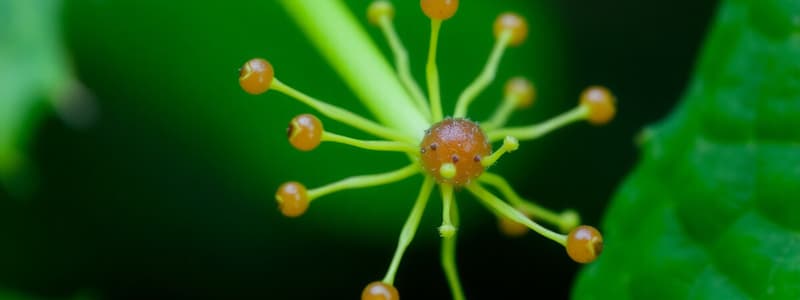Podcast
Questions and Answers
What is the primary purpose of classification in biology?
What is the primary purpose of classification in biology?
- To identify and modify genes
- To develop new reproductive techniques
- To enhance photosynthesis in plants
- To organize and name living organisms (correct)
Which process involves the conversion of light energy into chemical energy?
Which process involves the conversion of light energy into chemical energy?
- Growth and development
- Photosynthesis (correct)
- Respiration
- Cloning
What does PCR stand for in biological techniques?
What does PCR stand for in biological techniques?
- Protein Copying Regulation
- Polymerase Chain Reaction (correct)
- Plant Cloning Research
- Pathogen Cell Reproduction
Which of the following processes can be asexual?
Which of the following processes can be asexual?
Which biological concept links organisms to their environment?
Which biological concept links organisms to their environment?
Which branch of biology focuses on the study of microscopic organisms?
Which branch of biology focuses on the study of microscopic organisms?
What is the primary function of DNA in living organisms?
What is the primary function of DNA in living organisms?
Which process explains the change of species over time due to environmental adaptations?
Which process explains the change of species over time due to environmental adaptations?
What is the fundamental unit of life?
What is the fundamental unit of life?
Which of the following best defines metabolism?
Which of the following best defines metabolism?
What branch of biology studies the relationships between organisms and their environment?
What branch of biology studies the relationships between organisms and their environment?
What is homeostasis?
What is homeostasis?
Which term describes the variety of life on Earth across all levels, from genes to ecosystems?
Which term describes the variety of life on Earth across all levels, from genes to ecosystems?
Flashcards
Botany
Botany
The study of plants, including their structure, function, growth, reproduction, and evolution.
Cells
Cells
The basic structural and functional units of all living organisms.
DNA
DNA
The molecule that carries genetic information; responsible for passing traits from parent to offspring.
Genes
Genes
Signup and view all the flashcards
Metabolism
Metabolism
Signup and view all the flashcards
Homeostasis
Homeostasis
Signup and view all the flashcards
Evolution
Evolution
Signup and view all the flashcards
Natural Selection
Natural Selection
Signup and view all the flashcards
Classification
Classification
Signup and view all the flashcards
Respiration
Respiration
Signup and view all the flashcards
Photosynthesis
Photosynthesis
Signup and view all the flashcards
Reproduction
Reproduction
Signup and view all the flashcards
Growth and Development
Growth and Development
Signup and view all the flashcards
Study Notes
Branches of Biology
- Botany studies plant structure, function, growth, reproduction, and evolution.
- Zoology focuses on animal behavior, physiology, evolution, and classification.
- Microbiology explores microscopic organisms like bacteria, viruses, fungi, and protists.
- Genetics studies heredity and inheritance, including genes, DNA, and gene expression.
- Ecology examines organism-environment relationships and ecosystem interactions.
- Evolutionary Biology studies species origin and diversification over time.
- Cell Biology focuses on cell structure and function.
- Molecular Biology examines molecules like proteins and DNA in living organisms.
- Physiology studies the functions of living organisms and their parts.
- Biochemistry studies chemical processes in living organisms.
Key Concepts in Biology
- Cells are the basic structural and functional units of life, found in all living organisms.
- DNA carries genetic information, transmitting traits to the next generation.
- Genes are DNA segments coding for specific proteins and traits.
- Metabolism involves all chemical reactions within organisms, including building (anabolism) and breaking down (catabolism) molecules.
- Homeostasis maintains a stable internal environment.
- Evolution is the change in species over time due to natural selection acting on heritable variations, explaining the diversity of life.
- Natural Selection favors traits beneficial for survival and reproduction in a given environment.
- Ecosystems encompass communities of organisms interacting with their physical surroundings.
- Biodiversity is the variety of life at all levels, from genes to ecosystems.
- Classification organizes and names living organisms based on shared characteristics and evolutionary relationships.
Fundamental Processes of Biology
- Respiration acquires energy from nutrients, often with oxygen.
- Photosynthesis converts light energy into chemical energy (sugars) for plants and some organisms.
- Reproduction creates new organisms: asexual (one parent) or sexual (two parents).
- Growth and development increase organism size and complexity over their life cycle.
Techniques in Biology
- Microscopes visualize small structures, like cells and organelles.
- Gel electrophoresis separates DNA, RNA, or proteins by size and charge.
- PCR amplifies specific DNA sequences.
- Cloning creates genetically identical copies of an organism or gene.
- Genetic engineering modifies genes for desirable traits.
- Bioinformatics analyzes biological data, like DNA sequences, using computational tools.
Interrelationships in Biology
- Biology is interconnected. Genetics and cell biology reveal organism function and interactions. Ecology links organisms to their environment. Evolutionary biology explains organisms’ relationships and diversity.
- Biology integrates concepts from chemistry and physics to understand biological mechanisms.
- Biology significantly impacts medicine, agriculture, and environmental conservation.
Studying That Suits You
Use AI to generate personalized quizzes and flashcards to suit your learning preferences.




